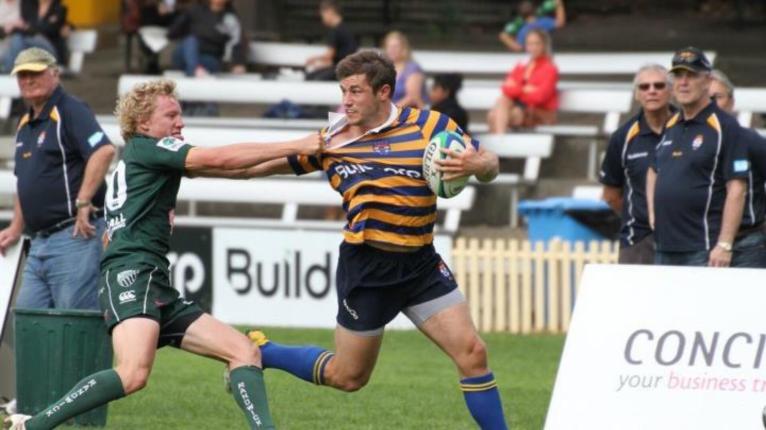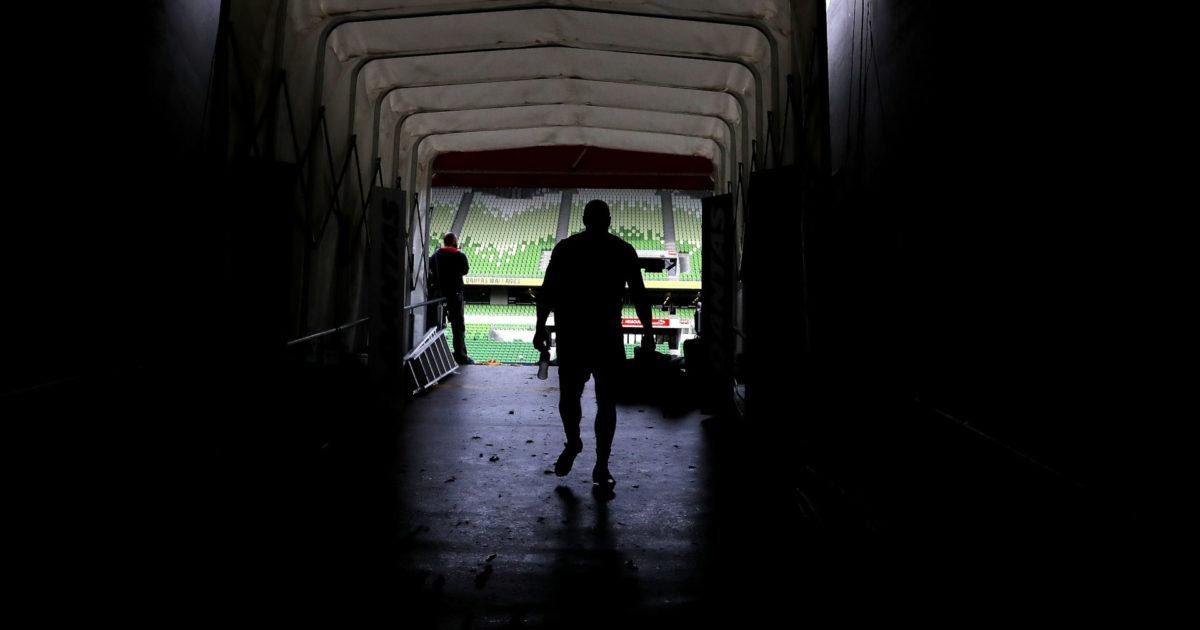The rugby nobody whose book is outselling Jones, Gatland and McCaw

Ben Mercer has to pinch himself to make sure he isn’t dreaming. Log onto Amazon UK, search for rugby books and up comes Fringes: Life on the Edge of Professional Rugby, the No1 best-seller written by the retired 33-year-old about his nomadic career in the shadows with a variety of Championship clubs before a switch across the channel to the backwaters of the French game at Rouen.
It’s an extraordinary feat, a little known ex-midfielder writing his autobiography on a whim and leaving established rugby big-hitters such as Eddie Jones, Sam Warburton, Warren Gatland, Rory Best and Richie McCaw in the shade on the go-to book website for buying your long-read sporting fix with the world currently at a standstill.
Think of the major publishing houses, the PR agents, the ghostwriters, the snazzy pictures and all the rest of the glitzy package behind all those publications about the game’s household names. Mercer, in sharp contrast, all but did it by himself. Painstakingly so. Wrote the book, self-published, self-promoted. Became a best-seller in the coronavirus pandemic. No wonder he is hunkered down at the old family home outside Bath during lockdown with a disbelieving smile etched firmly to his face nearly two years after he hung up the boots in Normandy.
“I completely get it why people want to follow the top guys… but there are some good stories out there with the lower-level guys,” he said to RugbyPass, assessing why his offbeat story is suddenly proving popular. “In France, there is a lot more mobility between divisions. The teams that come up through the ranks in the Pro D2, there is some great stories there and great players as well.
“(Anthony) Bouthier, who is in the France team now, he was playing against us for Vannes in the third division. There are some interesting stories to be told but I completely get it, you have to give the people what they want and if people click on whoever the main guys are, that’s just how it is.”
@MikeTyson is down! (it's an amazing book)
you're next @Tyson_Fury ? pic.twitter.com/BaklFvCtnJ
— Ben Mercer (@bcemercer) April 29, 2020
For now, though, people are clicking on the unheralded Ben Mercer, eager to learn about a colourful journey a world away from any top-flight glamour. “When I stopped playing and came home from France I was down in Cornwall with my mates,” he said, explaining the utopian moment when he decided to pen to paper.
“I was telling them about the day-to-day and things that had happened and they were like, ‘What?’ Those are guys who follow rugby but had no idea what goes on. That was the first time I decided to do something and explain it in a reasonably clear way to people who follow the game.”
His breezy, first-hand reflection on what life is really like as a journeyman professional athlete is a pleasing page-turner. “I was completely on my own. I kind of did every bit of it. I’d obviously gone and found an editor and then a cover designer, and I was really pleased with what I put together.
“But to see it up there with those sort of books – I mean, yesterday it was knocking up in the main sports category with Tyson Fury and Mike Tyson, so that is awesome. And just to get messages off people, particular as the book is a different perspective… I’m not a sporting figure like those people, so to see it do that has been great,” he said, satisfied the various intriguing dressing room revelations haven’t soured friendships picked up on travels along rugby’s lesser travelled roads.
“I say in the intro there are certain things that could get people in trouble. Knowing that those things happen is good enough for a reader and I don’t think you need to know exactly who that person is all the time… there was a really fun evening where I got to about 30,000 words. I was like, ‘This is now a serious thing’ and I texted our team WhatsApp group and said, ‘I’m doing this’. We’d this really fun evening with all these messages rolling in. Do you remember this? Remember that? All those little bits… my mates were on board with it and they helped me out.”
Mercer was never a million ever miles away from understanding the ebb and flow of a top-flight rugby career. It was on his own doorstep, his 30-year brother Guy spending a decade in the ranks at Bath before quitting last year. Ben, though, moved in very different circles after exiting the Bath academy, his head always held high despite the lower professional level he was performing at.
There were seasons at Plymouth Albion and Cornish Pirates sandwiching a short part-time spell in Sydney before four years at regional level in France, that invite arriving out of the blue from Richard Hill, the ex-England scrum-half who eventually took Rouen Normandie into the Pro D2 in 2019, the season after Mercer had finished. “I’m incredibly proud of Guy. He did what he always wanted to do, play for Bath. I would have liked to have done that too, but it wasn’t a competitive thing in that respect and I didn’t feel diminished by what he did.

“I left university and went to the Championship. I wanted to do as well as possible and get up to the top division. That was essentially it. I didn’t get too badly paid. It wasn’t good, but I had a load of bonuses added into my first contract that Plymouth thought I wouldn’t get, so I ended up getting them and ended up living reasonably comfortably. In France, it was a better deal, similar money to what we would get in the Championship but you only paid a minimum amount of tax, had an apartment, had a car, and didn’t have expenses.”
Mercer didn’t reach the holy grail of Pro D2, Rouen instead negotiating the Federale system while he was there, but he heard and saw enough to be able to compare the mechanics of the French second tier with the goings-on in an English Championship now under severe financial pressure due to RFU cutbacks and the revenue-killing virus outbreak.
“Pro D2 salaries vary wildly,” he suggested. “We’d a guy who plays for Castres now, Wilfrid Hounkpatin. He was on an academy contract at Montpellier when young, something like €800 a month and bunged in a flat, but there were guys in Pro D2 who were on €15K, €20K a month so the salaries vary outrageously. In the Championship there are a couple of blokes who would be on a decent deal but for the most part, we had guys at Pirates who were on £6K a year. I don’t know how you can survive on that money?
https://www.instagram.com/p/BWqDuhiBsWw/
“The Championship guys are the guys that need the support because their salaries are bad. The RPA were really good with my brother when he was leaving Bath and what they are doing with helping guys get prepped. People have loads of good things to say about what they do. The only thing that is a shame is that the guys that need their help, the guys in the Championship, aren’t getting it and that should definitely be addressed.”
Just like his book, Mercer’s interview was peppered with little vignettes about some of the obstacles clubs regularly place in the way of players looking to be their best. “We’d a guy come down on loan to Plymouth from Bath, Kane Palma-Newport, a friend of my brother’s. I was, ‘Where are you staying, Kaine?’. He was, ‘I’m in the club apartment’. I was like, ‘Go and have a look and if you want to stay that’s fine, but if you want to sleep on my sofa you’re more than welcome’. He took one look at it and was, ‘Please can I have your sofa?’
“There is a conveyor belt of blokes who want a Championship opportunity which is fine. There will always be people that will take that opportunity because the allure and hope of getting to the Premiership is very strong, but it’s just not good. It’s pretty poor and you need to draw a line in the sand one way or another.
I've written a book about life as a lower tier pro, why you do it (usually because like Dan you love rugby and get to go abroad to play), why it's precarious and how it can go very wrong very quickly!
take a look – I'd love to talk to you about ithttps://t.co/KvwD4RzNq8 pic.twitter.com/4AsoruI2Yv
— Ben Mercer (@bcemercer) April 13, 2020
“With the current situation, they are going to have to seriously reconfigure the whole sport. They are talking about global calendar, talking about a whole lot of different things they have been prevaricating on and kicking the can down the road for quite a long time.
“But now they are having to stare it in the face. You almost wonder if they just regionalised the whole thing and then played off in an eventual grand final. I can’t see anything like that ever happening but it is the time now because the sport doesn’t work and they have been hoping not to confront it.”
Any personal regrets about his own career? They are very few. “I got called up for England Students at university but tore my hamstring that week so couldn’t play. That was a bit annoying and there were some other opportunities every now and again. Sliding doors. There was one in France in my first year. A Pro D2 team got in touch. They were up the top of the league and I hurt myself, a four- to six-weeker. I said, ‘This has happened’. They came back and said, ‘Thanks for being honest’.
https://www.instagram.com/p/BAJl87BsN3Z/
“But I was really lucky to go to France. I always wanted to learn a language and get stuck in, and we’d such a diverse squad, guys from Georgia, Romania and wherever else, guys you don’t meet going about your day to day in your English teams. Just having that diverse experience, seeing an amazing country and getting to travel around and get paid, there are no two ways about it – you can use rugby to go and do things you wouldn’t get to do otherwise and I’m really pleased I got the opportunity.”
Now the quest is carving a career in the rugby afterlife, his book writing and a role as head of content at the Life After Professional Sport online platform keeping him ticking him along for now. “It’s hard. For a while, you’re thinking there isn’t anything I’m interested in. You have that experimentation period once you’re out of the group, but I knuckled down, got the book done and now feel there is a sense of positivity.”
Topping the heavyweight rugby book chart has that kind of galvanising effect.
























































